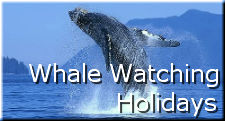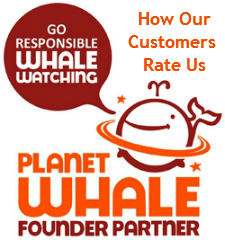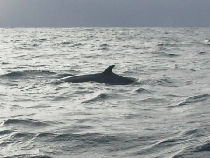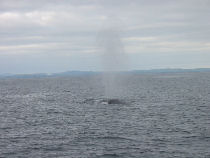Whale Facts |
|
The classification order Cetacea contains all species of whales, dolphins and porpoises. The order Cetacea comprise two sub-orders, Mysticeti, those known widely as baleen whales, and Odontoceti, the toothed whales including Sperm Whales, Beaked Whales, Monodontids (Beluga and Narwhal) River Dolphins, Oceanic Dolphins and Porpoises. Together, these two suborders comprise 13 different classification families divided into 40 genera. Within these 40 genera there are over 80 known species of whale, dolphin and porpoise. The odontocetes and the mysticetes are differentiated by two very distinct morphological characteristics. Odontocetes have teeth and a single blowhole. Mysticetes have baleen and two blowholes. Additionally, echolocation is used by odontocetes in locating prey but mysticetes do not echolocate according to the strict definition of the word. Many of the whale facts that we have today have been based on information on dead or captive animals. A greater effort is now being made to gather whale facts based on the study of live animals in their natural habitat, difficult though that is. Facts about WhalesMany of the larger whale species were badly depleted in numbers before the moratorium on commercial whaling was introduced in 1986. Many have shown significant recovery since then but others like the Northern Right Whale remain critically endangered. The Japanese have continued killing whales under the loophole of "scientific" whaling in the last 20 years but have directed their attentions largely towards the more locally abundant Minke Whale. Although much of what we know about whales and dolphins has been derived from animals killed by whalers many people believe that important facts about whales should be gathered through non-lethal behavioural and environmental studies. Many of the facts about whales have been gathered from the interaction between man and captive animals. Commercial WhalingAnti-whaling nations and conservation groups are currently very concerned that the Japanese are to widen their species profile to include Humpbacks and Fin Whales in their "scientific" whaling programme. They have also stated they intend to double their minke whale kill to just under 1000 animals per annum. The International community consider this activity a yet further flagrant breach of the moratorium imposed by the International Whaling Commission and to be commercial whaling by another name. The whaling nations of the world including Norway, Iceland and Japan are working hard for a resumption of commercial whaling which, if passed, would likely deplete the number of cetacean species. It is likely there would be a free-for-all of whale killing where quotas were flouted, as happened during the previous era of commercial whaling and where so many species were reduced to perilously low levels. It is a sad reflection on the state of the human psyche that during a time of unprecedented environmental depletion nations would even consider the killing of a protected species of marine mammal in International waters - Japan, Norway and Iceland continue this practice for commercial gain. Even if the harvesting of endangered species for commercial gain were acceptable in the 21st century the morality of the methods by which whales are killed are indefensible. Some whales take up to 30 minutes to die while attempts are variously made to dispatch the animal by electric shock or high-powered rifle. This is unacceptable by any civilized nations standards. In October 2006 Iceland announced it's intention to start commercial whaling again. They have started killing Fin Whales as part of their self allocated commercial quota in addition to Minke Whales. Fin Whales are currently listed on CITES and the IUCN red list as endangered and threatened. This action has set back the work of marine conservationists 20 years and following a decade of unprecedented marine degradation this action sends out completely the wrong message to our children with regard the need to protect and conserve vulnerable marine species and their environment for future generations. There is absolutely no scientific or commercial justification for killing whales, especially endangered species like the Fin Whale. There is little or no domestic market in Iceland for whale meat and exporting endangered Fin Whale meat would contravene CITES. Iceland’s decision to restart commercial whaling is senseless, irresponsible national posturing that will serve nobody’s interest, deplete the stock of an already endangered species and will do lasting damage to Iceland’s increasingly tarnished image on the world stage.
Read more on:
Return to TopOur Dolphin & Whale Watching Tours
|
Click on images for larger view:
|
Whale WatchingWhale Watching in IrelandWhale Watching TripsWhale Watching HolidaysDolphin WatchingDolphin EncountersDolphin HolidaysOther Marine Wildlife Tours |
More About WhalesWhale ConservationWhale PicturesMore About DolphinsDolphin PicturesPorpoisesSealsAbout
|
Did you know...?
The Northern Right Whale is likely to be the first baleen whale to face extinction as a result of the activities of man. Reduced to perilously low levels through decades of commercial whaling the Northern Right Whale has failed to show any recovery in population numbers as other species have and faces threats from commercial shipping, recreational craft and entanglement in fishing gear. Their numbers are currently estimated to be around 300.Inspirations
....the ecological crisis is a moral issue - respect for life and for the dignity of the human person extends also to the rest of creation...Pope John Paul II














